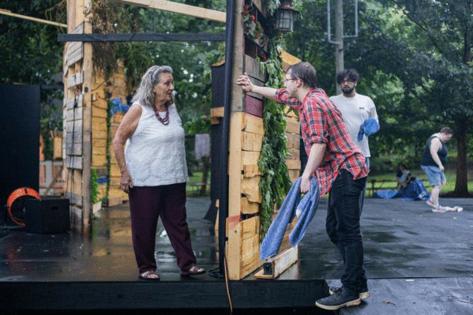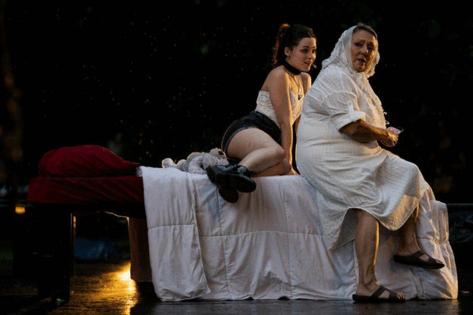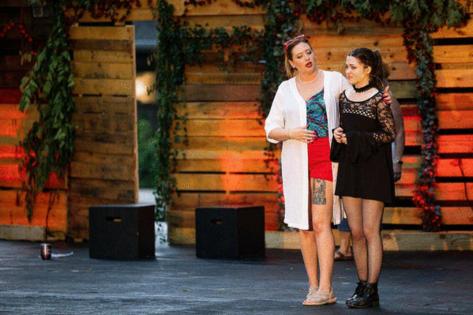'The people over the art form': Creating community through Shakespeare at the Park
Published in Lifestyles
LEXINGTON, Ky. -- Treyton Blackburn always thought he wanted to be a director.
Growing up in Pikeville, Kentucky, he was involved with community theater, mainly as an actor. He studied theater at the University of Kentucky, where he got into directing through the department’s student-led theater department.
“I was always curious about the construction of plays and about putting shows together,” Blackburn said in an interview with the Herald-Leader. “When I got to college...I was encouraged to give it a shot.”
Blackburn said once he stepped behind the scenes in college, he discovered being a director wasn’t just a role, but the thing he wanted to do for the rest of his life.
For the last three years, Blackburn has been working with Antagonist Productions on the Shakespeare in the Park project, most recently directing “Romeo and Juliet” this summer. Shakespeare in the Park, which is an ongoing community theater project, gives local actors and directors the opportunity to put on these outdoor shows and keep the tradition going.
It’s been an annual summer tradition in Lexington and is now approaching its 10 year anniversary since moving back to Woodland Park, where the shows first began in 1982.
As Blackburn continues to collaborate with local companies directing different plays, he sees theater not just as art, but as a way to build a community for both the artists he works with and the audiences in Lexington.
Starting during his sophomore year at the UK, Blackburn directed one or two studio shows a year as he studied theater. In his senior year, he became the first undergraduate student to direct on the main stage, he said.
That was how he found his footing as a director before leaving college and working with community theaters in Kentucky.
Founder and director of Antagonist Productions Ian Scott said in the three years since starting to work with Blackburn on the Shakespeare in the park project, he recognized what makes Blackburn a versatile director.
“He’s always got a pretty gung-ho attitude about every project that he is working on, so he’s able to fit into places where a lot of people are like nah I don’t really feel like it,” Scott said.
According to Blackburn, his style of directing can be unique for different actors to work with.
His method for tackling Shakespeare includes taking the original plays out of their time period, which can sometimes be a barrier to entry for the audience.
“When you do that, you have to conceptualize a new world for the play to exist in,” Blackburn said. “It’s always a task to convince a group of actors who all have their own feelings and opinions about the play ... to go on this journey with me.”
For Blackburn, no matter the show or the company, the community is what makes theater special for him.
“Directorship is really the only place in theater where you are connecting with every individual involved in the process,” Blackburn said. “It is a role of service and it give me the opportunity to get to know a lot of wonderful and talented people.”
That approach means the finished project is not just his. Blackburn compared being a director to allowing actors to play in your sandbox, and only telling them when sand has been kicked out of the box.
“I’m inviting a group of people who are probably more talented than I am into the world that I have dreamt up, allowing them to play and use their unique talents to tell the story in a really effective way,” Blackburn said.
Those connections are what really light Blackburn up.
“The things that theater can do are magical,” Blackburn said. “But for me, I’ll take the people over the art form any time.”
Even with this in mind, Blackburn said the importance of theater could not be understated, quoting Aristotle: “Drama provided a communal expurgation of emotions.”
Blackburn explained the quote as saying theater gives the audience a safe way to come to terms with things they might not be comfortable with.
“I think every community in the world right now needs a way to process really intense emotions without hurting each other,” Blackburn said.
That is what makes theater important for Lexington, according to Blackburn.
“If we can create a space where people can process their deeply held feelings ... in a way that is safe for themselves and the community, we may not be revolutionizing the world, but I do think we as artists are providing a very important service,” Blackburn said.
©2025 Lexington Herald-Leader. Visit at kentucky.com. Distributed by Tribune Content Agency, LLC.

































Comments